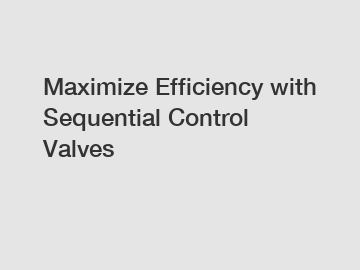Maximize Efficiency with Sequential Control Valves
Huade Hydraulic Product Page
Maximize Efficiency with Sequential Control Valves
Sequential control valves are essential components in many automated systems, helping to maximize efficiency and control the flow of fluids or gases in a precise manner. By controlling the sequence of operations, these valves can help optimize performance and productivity. In this article, we will discuss how to effectively use sequential control valves step by step to achieve optimal results.
Step 1: Understanding the System
Before implementing sequential control valves, it is crucial to have a deep understanding of the system you are working with. Identify the components involved, the sequence of operations required, and the desired outcome. By having a clear understanding of the system, you can effectively design a sequential control valve setup that meets your specific needs.

Step 2: Selecting the Right Valve
Once you have a thorough understanding of the system, the next step is to select the appropriate sequential control valve. Consider factors such as flow rate, pressure range, environmental conditions, and compatibility with other system components. Choose a valve that is reliable, efficient, and suitable for the task at hand.
Step 3: Installation and Setup
Proper installation and setup are critical for the optimal performance of sequential control valves. Follow the manufacturer's guidelines for installation, ensuring that the valve is correctly positioned and securely connected. Configure the valve settings according to the desired sequence of operations, taking into account factors such as timing, pressure, and flow control.
Step 4: Testing and Calibration
Once the sequential control valve is installed and set up, it is essential to test and calibrate the system to ensure smooth operation. Run test sequences to verify that the valve is functioning as intended and make adjustments as needed. Calibration may involve fine-tuning the settings to achieve the desired performance and efficiency.
Step 5: Monitoring and Maintenance
Regular monitoring and maintenance are key to maximizing the efficiency of sequential control valves. Keep an eye on performance indicators such as pressure, flow rate, and response time. Schedule routine maintenance checks to clean, lubricate, and inspect the valves for any signs of wear or damage.
By following these steps and implementing best practices, you can effectively maximize efficiency with sequential control valves in your automated systems. With proper understanding, selection, installation, testing, and maintenance, you can achieve optimal performance and productivity in your operations.
If you want to learn more, please visit our website 3 way proportional valve.

Comments
0